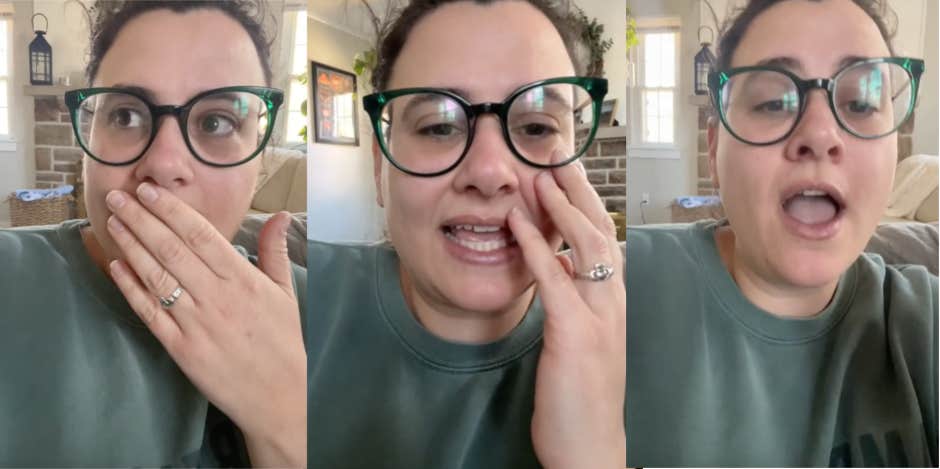Woman Gets Scammed Out Of $500 After A Man Calls From Her Sister's Number & Claims To Be Holding Her Hostage
She heard a woman crying on the other end of the call.
 TikTok
TikTok When we think of scams, our minds often immediately jump to emails from strangers asking us for money or phone calls telling us that a long-lost relative left us with a large inheritance in an overseas account. But scammers can target anyone and take many different forms, even sinister ones involving your own family members.
In fact, some of the most believable scams utilize real-life emergency situations in order to make victims act fast and transfer money. So, it can be hard to know if you're in the midst of a frightening situation or if you're being the victim of a scam.
A woman got scammed out of $500 by someone pretending to have her younger sister hostage.
Beth Royce posted on the video-sharing app TikTok her experience with a virtual kidnapping ransom scam.
It started with a phone call at 7:20 A.M. Royce’s screen lit up with her sister’s contact. However, when she picked it up, the person on the other line was not her sister.
“It was her face that popped on my phone. It looked exactly like my sister was calling,” Royce said. “So, I answered it and it was a man’s voice on the other end screaming at me.”
He told Royce that he had her sister hostage and not to contact anyone, including the authorities. She shared that she doesn’t fall easily for scams like “phishing emails” and other common ones, but this one felt incredibly realistic.
“It’s so hard for me to describe to you how real this all sounded,” Royce said. “He sounded completely unhinged. He sounded crazy.”
Luckily, her mom was at her home visiting from out of town, so Royce woke her up to quietly call 9-1-1 without the caller hearing. On top of the man screaming on the other end of the line, she also heard chilling background noise.
“I heard muffled sobs in the background that sounded like a woman’s voice. So, of course, I was like ‘oh my god,’ that’s my sister,” she said.
Royce spent the next 15 minutes trying to pacify the situation by engaging in small talk with the unknown caller. He then asked for money, and his explanation for why he needed it made the call feel even more real. He told her, “‘I just got out of jail. I’m just trying to get home. I’m not a bad person.’” He even started crying.
At one point, Royce was even left with "chills" when she heard a sob in the background, which she presumed to be her sister. What the scammer said next made her terrified.
“‘Listen, you need to calm down. You’re going to hurt yourself,’” he said. “’ I’m going to get money from your sister, and then everything’s going to be fine. I’m going to let you go.’”
Royce ended up sending the person money. She shared that he didn’t ask for money in any of the usually suspicious ways, such as with gift cards, which made her believe him. It wasn’t until her mom called her sister’s phone number and she picked up that Royce realized he had scammed her. However, Royce isn’t the only one fooled by this disturbing scam.
People in the comments shared their experiences.
“This happened to my mom. They told her they’d taken my sibling. She heard screaming. Sent them over 10K. She ended up being hospitalized that day,” one person wrote.
Someone else offered insight into how the scammer was able to call from her sister’s number. “This happened to my friend last week too but it’s a well-established scam. They spoof the number,” a person commented.
“My dad lives in Mexico and he gets scam calls all the time [from] people claiming they kidnapped me and he has to pay to get me back. Not real, yet scary!” another added.
Royce followed up with a second video explaining that she sent the scammer $500 before she knew her sister was safe.
In 2017, the FBI published its first official statement on these scams. The FBI shared that the scam has been prevalent for decades in Mexico and southwest border states, but only recently has it spread to the rest of the rest of U.S.
Scammers impersonate real people’s numbers, which is called “spoofing.” On top of reporting the call to the police, it offers four suggestions to avoid falling victim to these attacks.
“The key is to slow down the process. Ask to speak to your loved one. Ask a personal question — such as a birth date or color of the person’s hair or eye color,” the FBI wrote. “If the person refuses those requests, have someone else try to call or text your loved one who you’re being told is being held hostage.”
Unfortunately, Royce followed the last suggestion too late. Hopefully, her story can spread awareness and prevent others from falling victim.
Ethan Cotler is a writer living in Boston. He writes on entertainment and news.
